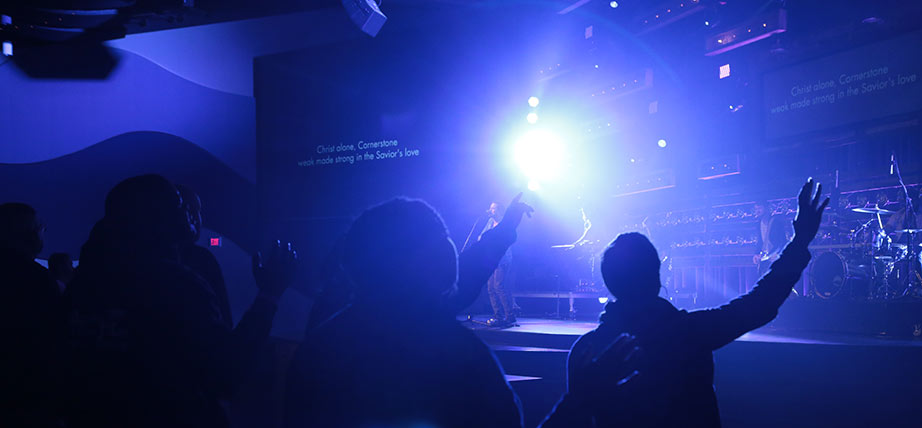I just left the movie theater. Alone.
I spoke to no one and I made eye contact with no one.
No words exchanged, no conversations.
And I thought to myself, “fan-tastic!” and yet my wife thinks I’m crazy.
Maybe you relate—feeling unbelievably recharged and ready for whatever comes after a quiet moment, away from people and responsibility even for a few minutes or hours. Over the last few years, the party game of deciding if you are an introvert or extrovert has given rise to freedom for the introvert from feeling guilty and anti-social. “Hey, I am an introvert. I’m going to go now.”
I have noticed as a songwriter and a worship leader for a large church that the people on my creative team and the teams we encounter at other churches and conferences in charge of service planning and production are largely introverts. This wonderful army of creative people—silently stealing away to recharge quietly, alone, and through engrossing creative projects—are all striving for excellence in planning and production as an act of worship to God.
SALT Conference attracts a large group of like-minded solo-rechargers in order to give them a platform to share and recharge and push their creative juices. It becomes a safe place to express and worship the Lord in the ways that each person does best. Worship comes in many forms—leading people in songs of praise and ascription to God is what I do. When leading a room full of people in worship, my goal is to bring people into conversation with the Creator. That being said, each gathering of people is unique in makeup and expectations…and if you will permit me, has it’s own personality profile.
Planning a worship service for SALT, an already identified band of creatives who—as described—do tend not to engage comfortably in demonstrative forms of group activities (like a worship service) merits some intentional planning for the worship leader.
A series of conversations occur before and during worship.
A conversation with yourself, the worship leader.
This conversation should be intentional and prayerful before worship on stage begins.
Romans 2:1— “Therefore you have no excuse, O man, every one of you who judges. For in passing judgment on another you condemn yourself, because you, the judge, practice the very same things.”
In corporate worship settings, introverts are used to hiding in the crowd of extroverts around them and can fade into the landscape. But at SALT, they will feel exposed and possibly uncomfortable with the extroverts removed for the most part.
The conversation between the worship leader and the Lord beforehand should be to prepare him or her to not judge each person’s heart based on the expression of worship that is demonstrated…or not being demonstrated.
If any worship leader is being honest, this is difficult to do because often seeking an expression of the worshipping crowd can wrongly become an evaluation of how well the worship leader perceives he or she is leading.

A conversation with the worship leader and the people.
This conversation is subtle. Because the worship leader is only going to have this group for a short amount of time (the conference), the conversation that happens will be short-lived and not likely change individual worship habits in one day. But it is important that the healthiness of Biblical expressiveness as a demonstration of worship is addressed. As a proud introvert, I studied scriptures about responses in praise, and soon realized that I had to get my heart to this place of worship. Then my actions could be a reflection of this transformation of my heart.
The Bible encourages people to do things that express devotion to God whether it be raising hands (1 Tim 2:8), clapping (Ps 47:1) or shouting (Ps 98:4). Psalm 150:4 says you can dance too, but I don’t want to push people too hard. This can be done through song selection, exhortation, and scriptures that speak to public expression of worship and pushes introverts out of their seats a bit.

A conversation with the people to God.
This conversation is really what the worship leader is after: getting each person into a conversation with God.
Hebrews 13:15— “Through him then let us continually offer up a sacrifice of praise to God, that is, the fruit of lips that acknowledge his name.”
Introverts will likely not have a problem with singing along with the crowd. I don’t want to paint a picture of shy wall flowers here, because if you are picturing this, you are wrong. These are people that are acknowledging the name of the Lord in the things that are most dear to them: their creative expression.

But what about the sacrifice God asks our praise to be? This is where it is hard, because sacrifice by definition is something that will cost you. And for an introvert, being asked to recharge spiritual batteries in a room full of people and demonstrating this Biblically…well, that is a sacrifice.
And for you fellow introverts who long for conversation with God that is unassuming and draws no attention, consider this: Your sacrifice of worship is a reflection of what you believe God has given you (Deuteronomy 16:17).
What is my encouragement for the SALT worship leader? Make eye contact, clap your hands, and have a conversation with God in corporate worship that offers to Him what you think He has given to you. The blessings He will give to you as you sacrifice will always outweigh the awkwardness you feel in the offering.


